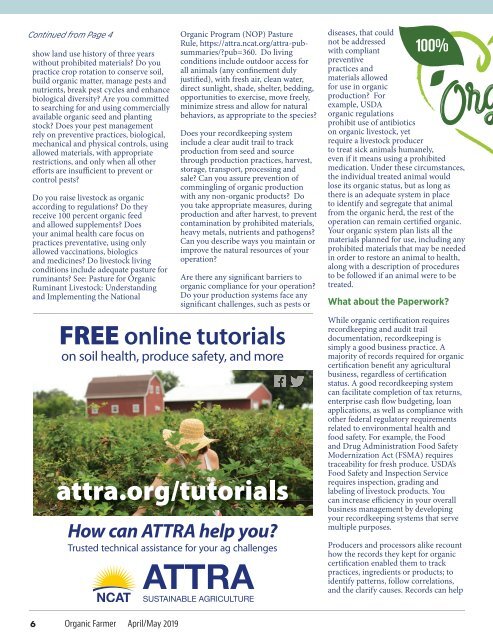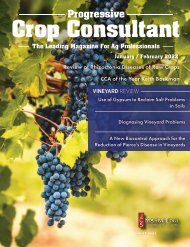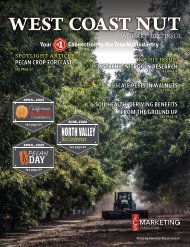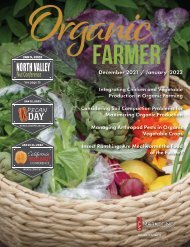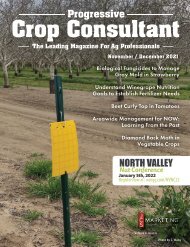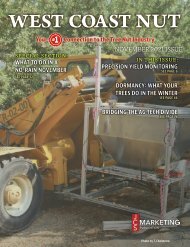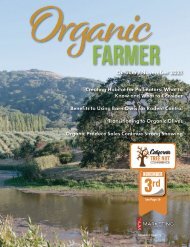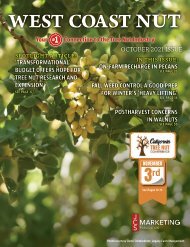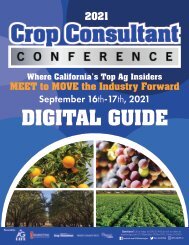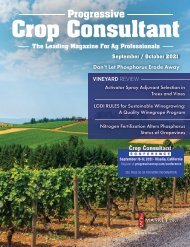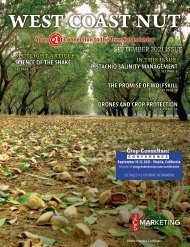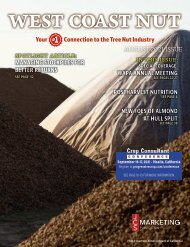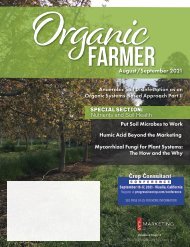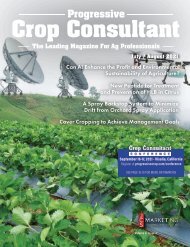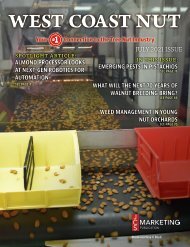OrganicFarmer_AprMayFinal_e
You also want an ePaper? Increase the reach of your titles
YUMPU automatically turns print PDFs into web optimized ePapers that Google loves.
Continued from Page 4<br />
show land use history of three years<br />
without prohibited materials? Do you<br />
practice crop rotation to conserve soil,<br />
build organic matter, manage pests and<br />
nutrients, break pest cycles and enhance<br />
biological diversity? Are you committed<br />
to searching for and using commercially<br />
available organic seed and planting<br />
stock? Does your pest management<br />
rely on preventive practices, biological,<br />
mechanical and physical controls, using<br />
allowed materials, with appropriate<br />
restrictions, and only when all other<br />
efforts are insufficient to prevent or<br />
control pests?<br />
Do you raise livestock as organic<br />
according to regulations? Do they<br />
receive 100 percent organic feed<br />
and allowed supplements? Does<br />
your animal health care focus on<br />
practices preventative, using only<br />
allowed vaccinations, biologics<br />
and medicines? Do livestock living<br />
conditions include adequate pasture for<br />
ruminants? See: Pasture for Organic<br />
Ruminant Livestock: Understanding<br />
and Implementing the National<br />
Organic Program (NOP) Pasture<br />
Rule, https://attra.ncat.org/attra-pubsummaries/?pub=360.<br />
Do living<br />
conditions include outdoor access for<br />
all animals (any confinement duly<br />
justified), with fresh air, clean water,<br />
direct sunlight, shade, shelter, bedding,<br />
opportunities to exercise, move freely,<br />
minimize stress and allow for natural<br />
behaviors, as appropriate to the species?<br />
Does your recordkeeping system<br />
include a clear audit trail to track<br />
production from seed and source<br />
through production practices, harvest,<br />
storage, transport, processing and<br />
sale? Can you assure prevention of<br />
commingling of organic production<br />
with any non-organic products? Do<br />
you take appropriate measures, during<br />
production and after harvest, to prevent<br />
contamination by prohibited materials,<br />
heavy metals, nutrients and pathogens?<br />
Can you describe ways you maintain or<br />
improve the natural resources of your<br />
operation?<br />
Are there any significant barriers to<br />
organic compliance for your operation?<br />
Do your production systems face any<br />
significant challenges, such as pests or<br />
FREE online tutorials<br />
on soil health, produce safety, and more<br />
How can ATTRA help you?<br />
Trusted technical assistance for your ag challenges<br />
diseases, that could<br />
not be addressed<br />
with compliant<br />
preventive<br />
practices and<br />
materials allowed<br />
for use in organic<br />
production? For<br />
example, USDA<br />
organic regulations<br />
prohibit use of antibiotics<br />
on organic livestock, yet<br />
require a livestock producer<br />
to treat sick animals humanely,<br />
even if it means using a prohibited<br />
medication. Under these circumstances,<br />
the individual treated animal would<br />
lose its organic status, but as long as<br />
there is an adequate system in place<br />
to identify and segregate that animal<br />
from the organic herd, the rest of the<br />
operation can remain certified organic.<br />
Your organic system plan lists all the<br />
materials planned for use, including any<br />
prohibited materials that may be needed<br />
in order to restore an animal to health,<br />
along with a description of procedures<br />
to be followed if an animal were to be<br />
treated.<br />
What about the Paperwork?<br />
While organic certification requires<br />
recordkeeping and audit trail<br />
documentation, recordkeeping is<br />
simply a good business practice. A<br />
majority of records required for organic<br />
certification benefit any agricultural<br />
business, regardless of certification<br />
status. A good recordkeeping system<br />
can facilitate completion of tax returns,<br />
enterprise cash flow budgeting, loan<br />
applications, as well as compliance with<br />
other federal regulatory requirements<br />
related to environmental health and<br />
food safety. For example, the Food<br />
and Drug Administration Food Safety<br />
Modernization Act (FSMA) requires<br />
traceability for fresh produce. USDA’s<br />
Food Safety and Inspection Service<br />
requires inspection, grading and<br />
labeling of livestock products. You<br />
can increase efficiency in your overall<br />
business management by developing<br />
your recordkeeping systems that serve<br />
multiple purposes.<br />
Producers and processors alike recount<br />
how the records they kept for organic<br />
certification enabled them to track<br />
practices, ingredients or products; to<br />
identify patterns, follow correlations,<br />
and the clarify causes. Records can help<br />
6<br />
Organic Farmer April/May 2019


